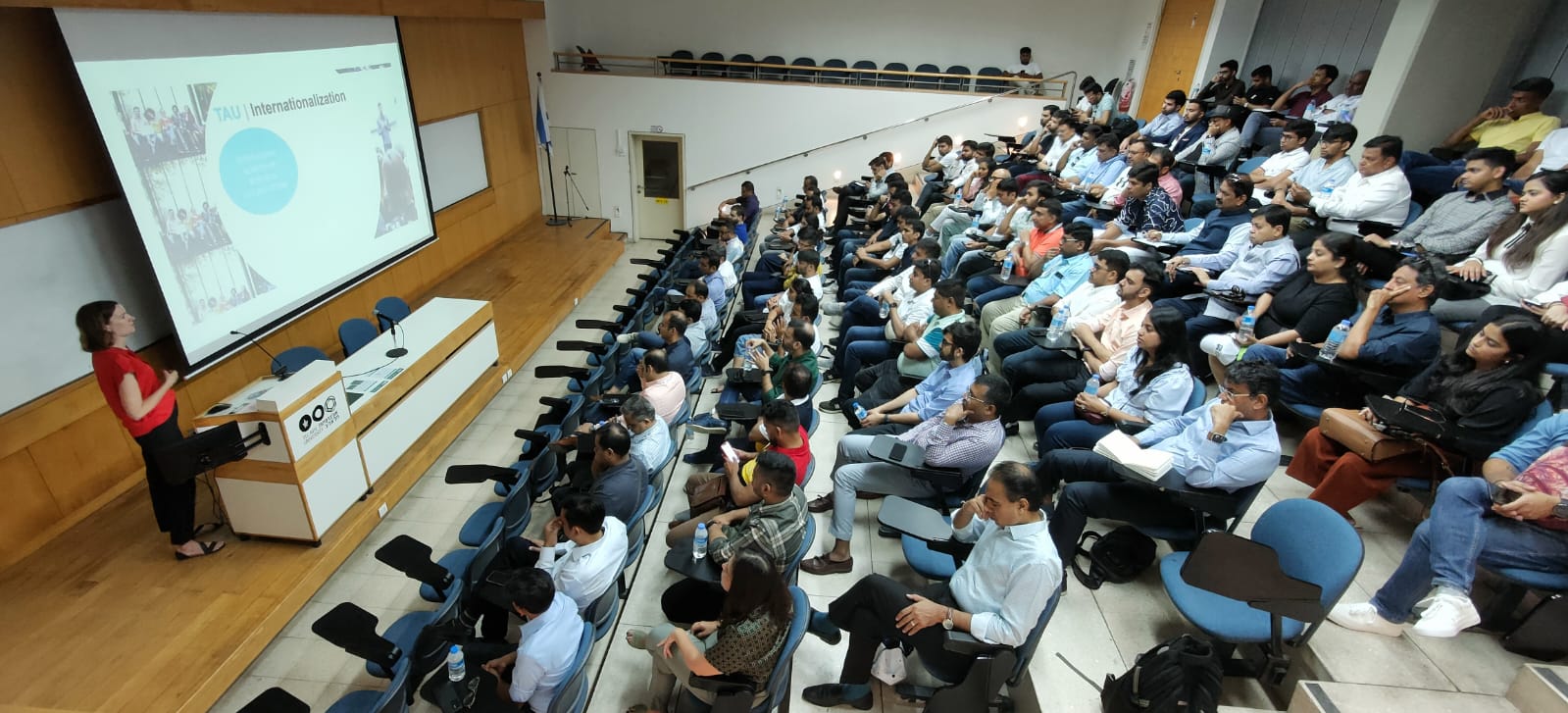A delegation of 90 entrepreneurs and investors from India’s JITO Incubation & Innovation Foundation was exposed to leading Israeli companies and accelerators in the fields of defense and homeland security, food-tech, smart cities, and cybersecurity during a visit last month to Israel.
The June 26-30 visit was facilitated by the Consulate General in Mumbai with the support of the Ministry of Foreign Affairs in Israel.
Kobbi Shoshani, Israel’s consul general to Mumbai and Midwest India, told The Media Line that this visit could be a boost for a free trade agreement (FTA), to be signed sooner or later between the two countries.

The delegation of 90 entrepreneurs and investors from India’s JITO Incubation & Innovation Foundation visit an Israeli university. (Courtesy Israeli Consulate for Midwest India)
He explained that the delegation from the JITO Incubation and Innovation Foundation was made up of the new generation of some of the most prominent businessmen in the country, who are indeed connected to most of India’s senior businessmen.
When politicians see such a large delegation come back from Israel full of enthusiasm, he said, “it gives a boost to the FTA.”
The decision to sign on to a free trade agreement is already on the way, Shoshani added. “I think it is going to be very soon, but this gave a boost for it to come even faster because this is the interest of India and Israel,” he said.
We actually have today another 90 ambassadors of Israel in India
Siddharth Jain, chairman of the JITO Incubation and Innovation Foundation, highlighted in an interview with The Media Line some of the places that the delegation visited.
This holiday season, give to:
Truth and understanding
The Media Line's intrepid correspondents are in Israel, Gaza, Lebanon, Syria and Pakistan providing first-person reporting.
They all said they cover it.
We see it.
We report with just one agenda: the truth.


He said that the delegation visited SIBAT, the International Defense Cooperation Directorate of the Israeli Defense Ministry; Tel Aviv University; the Aerospace Engineering Faculty at the Technion – Israel Institute of Technology; and the Foreign Ministry, where they were addressed by Indian and Israeli ambassadors.
“We will make permanent tie-ups with all these institutions for various purposes,” Jain said.
The Foreign Ministry hosted the delegation at its headquarters in Jerusalem on June 29 for briefings on India-Israel relations, and to discuss the scope of cooperation in the wake of the Abraham Accords and how to do business with Israeli companies.
Senior diplomats from the Foreign Ministry, including Naor Gilon, Israel’s ambassador to India; and Dr. Ron Malka, director-general of the Economy and Industry Ministry, also interacted with the delegation.
One of the key highlights, according to both Shoshani and Jain, was the purchase of two innovative Israeli-invented machines for breast cancer treatment by one of the Indian delegation members, as a donation to an Indian hospital.
Shoshani recalled that, right after listening to the pitch, “automatically one of them decided to buy two machines as a donation to an Indian hospital,” he said.
“We can gain, and India can gain,” Shoshani continued, “because we can gain not only breast cancer treatment, we can gain also a lot of experiment experience, knowledge, and data concerning the effectiveness of this machine.”
Jain noted that the deal “was solemnized in front of the ambassador to India from Israel.”
Aside from these high-quality visits to Israeli innovative companies, Shoshani said that it is extremely important that these 90 Indian entrepreneurs returned to India with a different impression of Israel.
“We actually have today another 90 ambassadors of Israel in India,” Shoshani said.
We want to harness the warmth between both countries to get the best outcomes. We can act as the Indian gateway for Israeli companies.
He stressed that these 90 entrepreneurs and investors-cum-ambassadors are very close to the senior businessman of India. “I think fields of cooperation with this group are extremely important, and the importance is not only business but also bringing to the knowledge of the most important people in India what is Israel,” he said.
Jain noted that 90% of the people that the Indian delegation met in Israel had been to India, but for 90% of the people in the delegation, it was their first visit to Israel. “Two-way traffic would lead to many great things,” he said.
“We want to harness the warmth between both countries to get the best outcomes. We can act as the Indian gateway for Israeli companies,” he added.
Many important connections were made during the visit, remarked Shoshani. “They were extremely amazed by the state of Israel,” he continued.
“I am more than 100% sure that business will come very soon. It is an important development for a future free trade agreement between Israel and India,” Shoshani said. “I’m sure that the most important politicians and businessmen in India heard about this delegation that visited Israel. They are making a lot of noise,” he added, noting that since the delegation’s return, three similar delegations have submitted requests to visit the consulate.